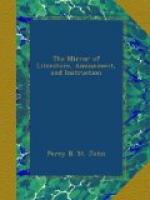After a time, that fit of burning agony went off;—tears came into my eyes;—my nature was softened. I thought of Bradley when we were boys, and of the summer days we had spent together. I never owed him a grudge—his blow was occasioned by the liquor—a freer heart than his, mercy never opened; and I wept like a maiden.
The day at last began to dawn. I had thrown myself on the bed without undressing, and I started up involuntarily, and moved hastily—I should rather say instinctively—towards the door. My father heard the stir, and inquired wherefore I was departing so early. I begged him not to be disturbed; my voice was troubled, and he spoke to me kindly and encouragingly, exhorting me to eschew riotous companions. I could make no reply—indeed I heard no more—there was a blank between his blessing and the time when I found myself crossing the common, near the place of execution.
But through all that horror and frenzy, I felt not that I had committed a crime—the deed was the doing of a flash. I was conscious I could never in cold blood have harmed a hair of Bradley’s head. I considered myself unfortunate, but not guilty; and this fond persuasion so pacified my alarms, that, by the time I reached Portsmouth, I almost thought as lightly of what I had done, as of the fate of the gallant French dragoon, whom I sabred at Salamanca. But ever and anon, during the course of our long voyage to India, sadder afterthoughts often came upon me. In those trances, I saw, as it were, our pleasant village green, all sparkling again with schoolboys at their pastimes; then I fancied them gathering into groups, and telling the story of the murder; again, moving away in silence towards the churchyard, to look at the grave of poor Bradley. Still, however, I was loth to believe myself a criminal; and so, from day to day, the time passed on, without any outward change revealing what was; passing within, to the observance or suspicions of my comrades. When the regiment was sent against the Burmese, the bravery of the war, and the hardships of our adventures, so won me from reflection, that I began almost to forget the accident of that fatal night.
One day, however, while I was waiting in an outer room of the colonel’s quarters, I chanced to take up a London newspaper, and the first thing in it which caught my eye, was an account of the trial and execution of Dick Winlaw, for the murder of Bradley. The dreadful story scorched my eyes;—I read it as if every word had been fire—it was a wild and wonderful account of all. The farewell party at the Granby was described by the witnesses. I was spoken of by them with kindness and commendation; the quarrel between Bradley and Winlaw was described, as in a picture; and my attempt to restrain them was pointed out by the judge, in his charge to the jury, as a beautiful example of loving old companionship. Winlaw had been found near the body, and the presumptions of guilt were so strong




